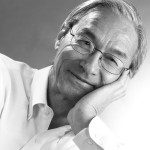How are you feeling today? Healthy, alert and full of vim and vigor? Or are you suffering from chronic aches and pains, fatigue or depression? If you’re in the latter camp, you must read a book that can honestly change your life: A Beautiful Medicine, A Radical Look at the Essence of Health and Healing by David Mercier.
Mercier has crammed a lifetime of knowledge into this book, which includes decades of clinical experience and even a two-year stint as a monk in a Buddhist monastery. It’s as much about curing the ills of the mind as it is about healing the ills of the body—because for Mercier, medicine involves looking at people not as a collection of body parts, but as living, pulsing human beings that are connected to a greater whole.
Mercier calls his philosophy “beautiful medicine” which he defines as “a vision for medicine that respects the soul and spirit at the core of human experience”.
Over the years, he has treated and helped cure thousands of patients through a combination of natural healing approaches, including acupuncture, and individual coaching sessions. Importantly, he noticed a common thread among many of his patients and the symptoms they brought to him.
While Mercier concedes that some symptoms are the signs of serious illness or injury, he believes the great majority of the aches and pains we experience need to be looked at in a fresh way—as symbols of deeper issues within our bodies and within our souls. In his words:
The symptom is a red alert, a warning bell, a siren, a bullhorn, a flashing light on the dashboard, the wailing of a smoke alarm, a baby’s cry in the night.
Mercier believes that when a symptom appears, causing you to be in discomfort or pain, this is not the problem itself but merely points to the problem. That’s why, whether it’s a backache, a migraine or a case of the blues, we need to be curious about the symptom’s intent and ask ourselves:
- “What’s the message?”
- “What am I being asked to do?”
- “Is there something missing that I need to add?”
- “Is there something present that I need to subtract?”
Mercier points out that the most common way we approach these symptoms or messages from the body is to blunt them without trying to understand their purpose. We do this through “medications, herbs, denial, overwork, alcohol, or other methods”. So we never get to the core issue, the problem that lies behind the symptoms.
So just what do our symptoms want? Mercier eloquently tells us that:
Our symptoms are often asking us to purge our bodies of grief, resentment, fear, and sometimes, plain boredom. At other times, they ask that we take a chance, speak out and risk being unloved, or that we forgive and start loving.
Mercier has met the enemy—and the enemy is us.
In his own practice, Mercier often finds that once he deals with the outward symptoms, he is able to discuss with his patients the true root of their problems. And often these problems are caused by poor lifestyle and work choices.
Headaches and insomnia can come from the contours of our lives, which are in turn shaped by our values and priorities. The headaches and insomnia can come from eating poorly and not exercising, which come from not having enough time, which comes from being too busy at work, which comes from the desire to have a certain income.
Most of our problems are self-induced and the author blames this on “the myth that happiness is the freedom to indulge without limits our overindulgent lives”. Mercier points out that “watching a sitcom with beer and chips in hand doesn’t inspire us to lead our best lives, or to seek the heights of human possibility”. In other words, we are often our own worst enemies. He concludes that:
It seems to me that the most common proximal sources of inertia are the allure of the sugar fairy, the siren call of daily drink, and the gravitational pull of the American couch. For many others, the inertia in taking care of their health comes from being under the whip of constant work overload and a frenzied schedule. They choose a lifestyle which allows them insufficient time to do good things for their bodies.
For things to change, we must heal ourselves. And while we can run to a doctor for a quick fix, ultimately this does not fix the problem. This means we need the courage to stand up and make the changes necessary to improve our lives, including a regular regimen of exercise and health eating. Again from the author:
If we cling to our resentments, if we fear standing up for ourselves, if we refuse to grieve as we must, if we deplete ourselves caring for others, our bodies will protest. Since they can’t for words and sentences, they gesture with insomnia, headaches, a pain in the belly, an ache in the shoulder, a shroud of weariness.
Throughout Beautiful Medicine, Mercier includes patient anecdotes that talk to the various health issues he has dealt with and how he helped to resolve them by getting to their root cause. You may see yourself in some of these stories. And in the final chapters, Mercier issues a call-to-arms to make things right in your life now, and here the book becomes a powerful spiritual treatise. Here’s an excerpt:
We’re here for a purpose, and that purpose is grander than our own individual designs for our lives…Living with a meaningful purpose, perhaps even one you would die for, paves the potholes of daily living.
Mercier fully believes, and he has further convinced me, that:
When you become fit and healthy, you’re taking out spiritual insurance and increasing the chances that the generosity of your soul will be more durable and available longer to those who need it most.
As the author points out, “true joy and contentment comes from helping others” and he quotes St. Francis who said “it is in giving, we receive.” But the fact is, to give and help others, and fulfill our own purpose on this earth, “demands that we are in good enough shape to do the tasks we are called to do. We must come first”.













